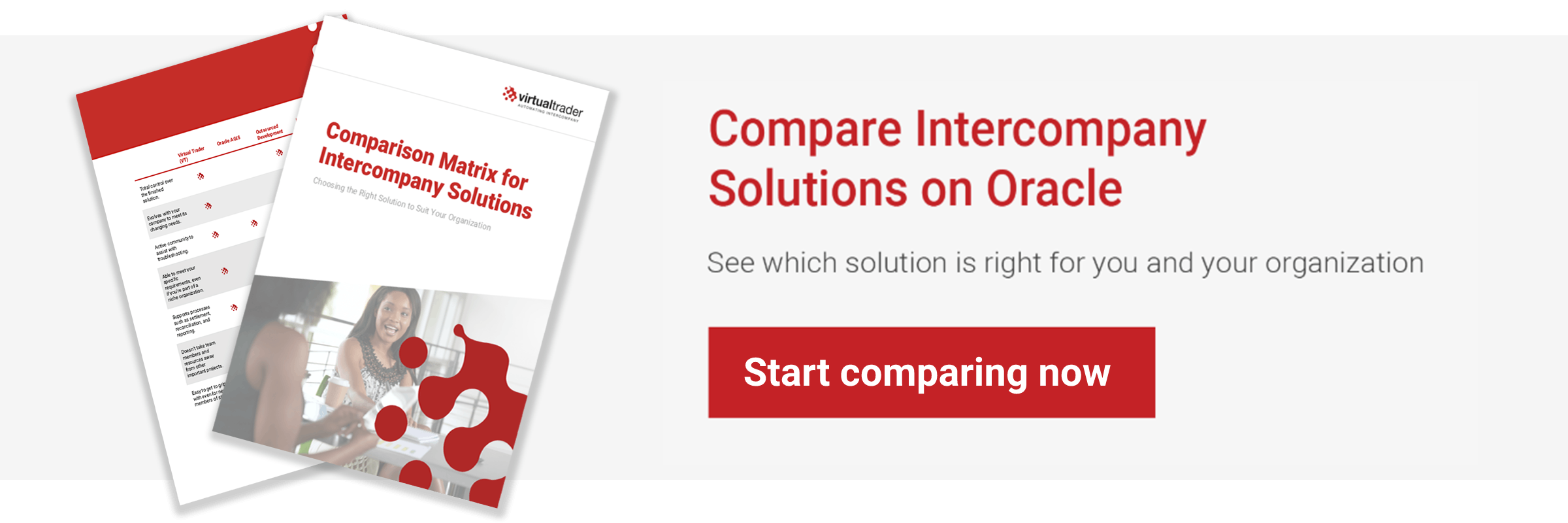It’s a serious and expensive problem. When intercompany transactions are neglected or mishandled, it can lead to incorrect reporting and poor decision-making. As you conduct trade with subsidiaries around the world, you need a system that can track and manage each step. Here are four ways to better manage your business’ intercompany transactions on Oracle.
How to Improve Your Intercompany Transactions
1. Raise Payables & Receivables back to back
One of the biggest sources of intercompany reconciliation problems is where intercompany payable and receivable transactions are raised independently from each other. They can each be valid in their own ledger, but not match each other between ledgers, leading to intercompany imbalance and reconciliation problems.
It may not always be possible to arrange for the payable and receivable to be raised back to back, but wherever it is possible the advantage should be taken. Good examples of this in Oracle are their ‘Drop Ship’ functionality and AGIS.
2. Automate Intercompany Activity
The intercompany process isn’t a smooth one for thousands of organizations. It’s time-consuming to reconcile balances, while still meeting the demands of having entities in multiple countries. Working across different time zones, currencies, laws and accounting systems introduces further complications.
By automating intercompany on trade transaction, and even management accounting and cross charges, you’ll find that there is less time and effort wasted. Automating the process reduces human error and balance issues at period close.
There are a number of facilities for automating intercompany within Oracle EBS such as Drop Shipment, Centralized Purchasing, inventory transfers and allocation journals. It’s far easier to match ledgers at the starting point with an automatic system, than frantically trying to the information you need to resolve the issue at period end.
3. Centralize Intercompany Management
Aside from reconciling intercompany balances, significant delay during close can be caused by intercompany dispute resolution. Often financial performance is measured at company level, and disputed items can be significant. However organizations should move towards a broader playing field.
Intercompany are monies not being spent, but simply moved within the organization. Centralizing the decision process on intercompany settlement allows a global view to be applied, that can accommodate any funding needs, and harness cash assets within the organization more efficiently.
Disputes can be resolved a month in arrears where required, rather than delay period close unnecessarily. Intercompany is the last item to be completed during the close process. Any steps that can save time and reduce problems, can make period close easier.
4. Improve Intercompany Visibility
Obviously having the company identified as the balancing segment within your Chart of Accounts (COA) is a must. But after that there are a number of options for intercompany.
Established wisdom these days is to have separate natural accounts for payables and receivables, rather than using a single account and differentiating with the sign. A credit for a return is a negative receivable, not a payable, and tax and trade authorities expect this distinction.
There is a significant benefit in being able to identify the counter party to a payable or receivable entry. Traditionally this would be through separate intercompany accounts for each company. However these days most organizations realize there is a greater visibility, and less fragmentation, in having a single set of intercompany accounts and identifying the counter party with a separate Intercompany segment in the COA.
Take the Next Step with Virtual Trader
Oracle EBS has a number of features to automate intercompany and ease the difficulties around reconciliation and period close. There is additional software available that can make intercompany transactions even more seamless and error-proof.
Virtual Trader (VT) works within the Oracle platform with the same look and feel to provide enhanced flexible intercompany functionality. The seamless integration with Oracle means there is no requirement for changes or customizations to the Oracle platform or EBS application.
Download our free comparison guide today using the link below. It details the options available to you when it comes to finding and implementing intercompany accounting software.




 US
+1 800 961 9640
US
+1 800 961 9640

